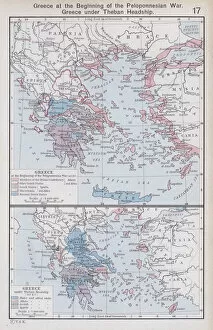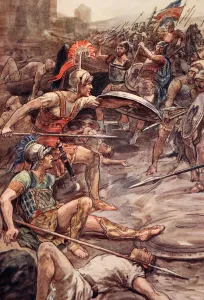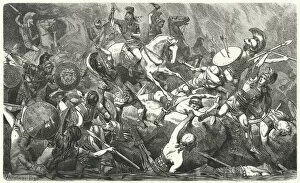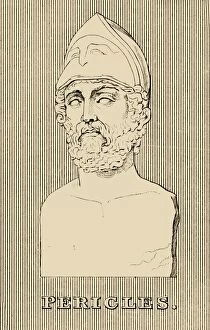Peloponnesian War Collection
"The Peloponnesian War: A Tale of Power, Politics, and Tragedy" In this captivating lithograph from 1830
For sale as Licensed Images
Choose your image, Select your licence and Download the media
"The Peloponnesian War: A Tale of Power, Politics, and Tragedy" In this captivating lithograph from 1830, we see the enigmatic philosopher Socrates amidst the chaos of the Peloponnesian War. As one of Athens' most influential thinkers during this tumultuous period, Socrates witnessed firsthand the devastating consequences that unfolded. The litho titled "Slaughter of the Pisistratide" depicts a gruesome scene where bloodshed was rampant. The war pitted Athens against Sparta and their allies in a struggle for dominance over Greece. This conflict would shape the course of history for years to come. Another colorful lithograph shows Greece under Theban Headship, highlighting how different city-states vied for power after Sparta's victory. Lysander's order to tear down Athen's walls is captured in an engraving - a symbolic act that marked Athens' loss and surrender. Epaminondas defending Pelopidas showcases bravery amidst adversity as depicted in Plutarch's writings. Meanwhile, another engraving portrays the defeat suffered by Athenian forces in Sicily - a significant blow to their empire-building ambitions. Notable figures such as Nicias and Pericles are also featured throughout these artworks. Nicias played a crucial role in shaping Athenian politics during this era while Pericles delivered his famous Funeral Oration honoring fallen soldiers who fought valiantly but succumbed to war's brutality. Two naval battles are illustrated; one showcasing an intense clash within Syracuse Harbor while another captures the retreat of defeated Athenians from Syracuse itself – both pivotal moments that sealed Athens' fate. Lastly, we have "Socrates at the Battle of Potidaea, " reminding us that even philosophers were not immune to being swept up by war's tide. It serves as a reminder that conflicts like these can engulf all aspects of society – intellectual pursuits included. These images offer glimpses into an era of strife, ambition, and tragedy.





















